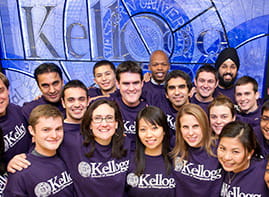A whole new playing field
Kellogg student and former NFL player Eddie George makes the transition from the 50-yard line to the bottom line
By Ed Finkel3/17/2009 - Most players come into the National Football League without an exit strategy, other than to make all the money they can and then find a hobby.
But if they live a typically flashy pro-athlete lifestyle, they will burn through their money and need more than a hobby when they’re finished, Kellogg Executive MBA student and former Heisman Trophy winner Eddie George recently told a sports marketing class of Full- and Part-Time MBA students.
And, he added, too many pro athletes burn too many bridges from their playing days that they’ll wish they could cross later on.
George, who was a Super Bowl running back in 2000 for the Tennessee Titans, said most football fans think players lead a life of money, expensive cars and “tons of women.”
“And that’s true,” he said. “It’s a wonderful lifestyle. … But it can consume you. You start to believe your own hype.”
NFL careers often end suddenly — some wags say the acronym should stand for “Not For Long” — and “you’ve got to understand the business side of things, or you walk away bitter and confused,” George said. “Nine years goes by like this,” he said, snapping his fingers. “And if you don’t take care of your money, you’re out on the street. It’s a scary feeling. You ask yourself, what’s next?”
By cultivating a wholesome image and striking the right endorsement deals as a player, George said, “You establish yourself as a businessman in the community.” When his playing career ended after a brief stint with the Dallas Cowboys, he packed up his truck and moved back to Nashville, “where I was valuable, where I had my best days. I wasn’t known as a Cowboy. I was known as a Titan.”
There, he has built a landscape architecture business called The Edge Group, which also has offices in George’s college town of Columbus, Ohio, and does projects all over the country. These days, the business is shifting from residential development to institutions such as universities and schools as the private real estate market cools.
George said he enrolled at Kellogg to broaden and deepen his understanding of the business side. “Like on the football field, if I’m going to be the best at something, I’m going to learn from the best coaches, the best teachers. Kellogg resonated because of the strong branding and marketing emphasis,” he said. “It’s given me a chance to reinvent myself and brand myself away from the game.”
Athletes known for being selfish or egomaniacal — or, worse, those who use steroids or get into trouble with the law — tarnish their own personal brand, sometimes forever, said George, who also works as a football analyst on Fox Sports Net and the Big Ten Network.
“Five, six years down the line, when you’re going to look for an opportunity, is that relationship going to be there?” he said. “It’s really important to put your brand together. Everybody’s a brand. As an athlete, you’ve got to cultivate that.”
George said he always worked to “carry myself appropriately” but made his share of mistakes — for example, he once showed up to an Adidas appearance wearing Nike shoes. “That’s when I said, ‘I’ve got to get on board.’ You can’t blow those opportunities.”
To make sure he found the right opportunities, George saw to it that his agent, who negotiated his contract with the team, did not handle endorsements as well, even though agents generally want to do so because it’s more lucrative than contracts.
“I didn’t want my agent dibbing and dabbing into marketing because that’s not his forte,” George said. An agent might strike a deal with a local discount mattress chain, for example, but “that’s not consistent with the brand.”
George also worked to be consistent when dealing with fans. “Even when I’m tired,” he said. “Fans look at it like, ‘Yeah, he runs the ball great, but is he a good person?’ ” George said. “You’ve got to keep it open. Otherwise, they’re not going to buy what you’re selling later.”
And players will need to sell something later, he said, because teams and owners are unsentimental. They look at numbers like your on-field statistics, your age, and most importantly, how much salary cap room you represent — and when they start drafting players at your position, it’s time to think about the future.
“It’s a cutthroat game. It’s not sad. It’s not good. It’s just the business. It’s glamorous from this end. But when it’s over, it’s over,” George said. “It’s a young man’s game in every sense of the word. Young men are cheaper, and they’re not as smart. … You’ve got to get all you can, save all you can, and build relationships. The stronger your network, the more powerful you’ll be.”
Rich Honack, professor of the sports marketing class, said George’s appearance was the latest of a series of speakers on marketing and management who have given students a behind-the-scenes look from a variety of perspectives. “It’s so they won’t have this rosy-colored view of the industry,” Honack said.
Student John McWilliams ’09 said he was impressed by George’s personal story of transitioning from a player to retired player. “For him to be here, it shows that in life, you have to be nimble and flexible in your opportunities,” he said. “For our school to pull a notable star like Eddie George, it makes me happy to be part of Kellogg.”






